A Report on Annual Regional Directors’ Conclave 2025 - Chennai
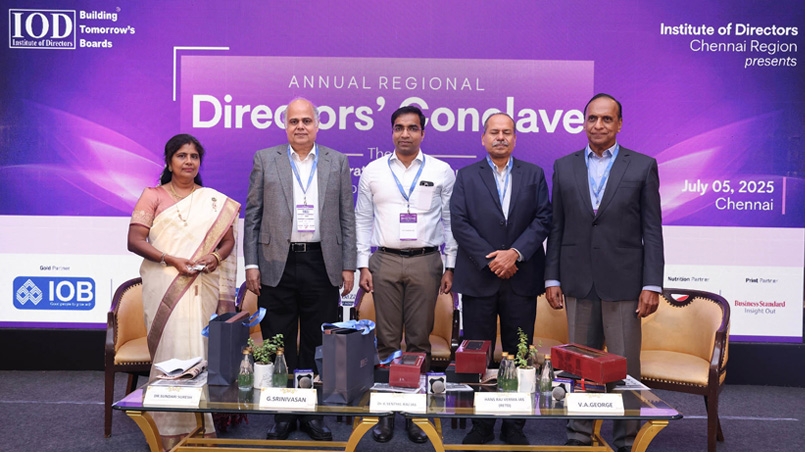
The Institute of Directors (IOD), Chennai Region hosted the Annual Regional Directors’ Conclave 2025, held on July 05, 2025 at Hotel GRT Grand, Chennai, Tamil Nadu. The event theme was “Board's Strategy on CSR and ESG for Promoting Inclusive Growth”.
This impactful event brought together roughly 148 delegates' comprising of government officials, business leaders, board members, directors, industry & board experts, policy-makers, and educationists.
The event commenced with the ceremonial lighting of the lamp and rendition of the Tamil Thai Vazhthu.
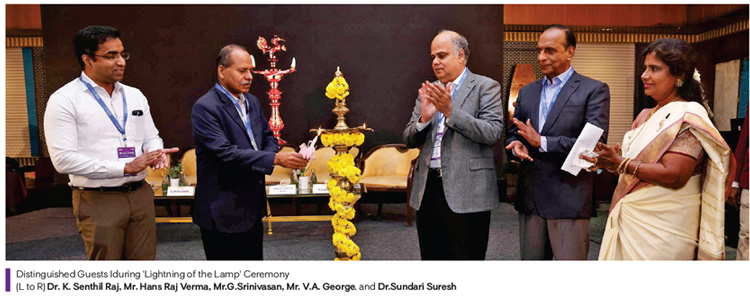
INAUGURAL SESSION
The 'Welcome Address' was delivered by:
Mr. G. Srinivasan
Hon. Chairman, Institute of Directors (IOD), Chennai Region
MD & CEO – Galaxy Health Insurance
Former CMD – The New India Assurance Co.
Mr. Srinivasan, opened the event by cordially welcoming all the participants and highlighting the critical role of the company boards in driving effective CSR and ESG strategies. He indicated the significant regulatory attention received by 'Governance' of ESG, while the 'Environmental' and 'Social' pillars are yet to catch-up corporate focus and integration. Hence, drawing up attention towards the environment and social pillar he pointed to the importance of acknowledging environmental threats and inclusion of equitable and diversified labor practices. He urged boards to embed ESG into core strategy, making CSR a strategic, transparent, and accountable function. Sustainability, he noted, must be led from the top and integrated across the organization.
This was followed by the 'Special Address' delivered by:
1. Dr. K. Senthil Raj, IAS
Managing Director - SIPCOT
2. Mr. Hans Raj Verma, IAS (Retd.)
Director General - Council of State Industrial Development and Investment Corporations of India (COSIDICI)
Dr. Raj, highlighted SIPCOT's pivotal role in Tamil Nadu's industrial transformation and calling attention to the following projects exemplifying their 'Social' and 'Environmental' pillars in action:
• Tertiary Treatment Reverse Osmosis (TTRO) plants
• Coimbatore plant
• Thoothukudi plant
• The industrial housing cluster at Vallam Vadagal
• Planting 7 lakh native saplings across industrial parks in collaboration with the Tamil Nadu Forest
Dr. Raj weighed upon his own experience of running a development corporation and stated that gone are the days when boards were custodians of shareholders alone. Today, they must act as stewards of all stakeholders.
He concluded with a powerful call to action: “Inclusive development through CSR and ESG is not just a responsibility—it is a commitment. To redefine progress, every board member must come forward to drive this change.”
Mr. Verma, in his Special Address on CSR & Biodiversity Conservation emphasized the critical role that biodiversity plays in shaping India's ecological & economic landscape. He emphasized the urgent need to integrate biodiversity conservation into corporate and supply chain strategies, particularly for MSMEs that significantly impact carbon emissions. Citing the Montreal Global Biodiversity Framework (COP15, 2022), he stressed that ESG is now a core business priority that enhances competitiveness. In collaboration with the United Nations, COSIDICI is mobilizing funding through public-private partnerships to drive biodiversity-focused climate action. Mr. Verma underscored that every element of biodiversity is essential in the ecosystem. He urged corporates to go beyond basic compliance, highlighting long-term benefits such as improved competitiveness, market access, and societal value. His concluding message: “Corporate participation in biodiversity is not just an environmental duty but a strategic business advantage. To secure the future businessman must become active stewards of the environment.”
The ‘Keynote Address’ was delivered by:
Mr. V. A. George
Executive Chairman
Thejo Engineering Ltd.
Chennai
Mr. George, delivered a reflective Keynote address focused on CSR implementation and challenges. Drawing from his industrial experience he shifted the conversation around CSR from mere compliance to meaningful engagements grounded in practical, community-oriented actions, directing the resources towards under-recognized and grassroots initiatives. By acknowledging the complexity of speaking on CSR, he set the stage for a candid discussion rooted in real-world observations considering sector-specific contexts when evaluating environmental impact. A recurring theme in his remarks was the importance of listening to internal stakeholders. By recognizing the operational challenges that come with community engagement, he highlighted the importance of navigating these issues with transparency and communication. He also pointed to existing models and local organizations working on infrastructural & institutional issues and encouraged companies to discover and partner with them. His address concluded with a reminder to reduce overconsumption, focus on long-term impact, and embed sustainability values in future generations.
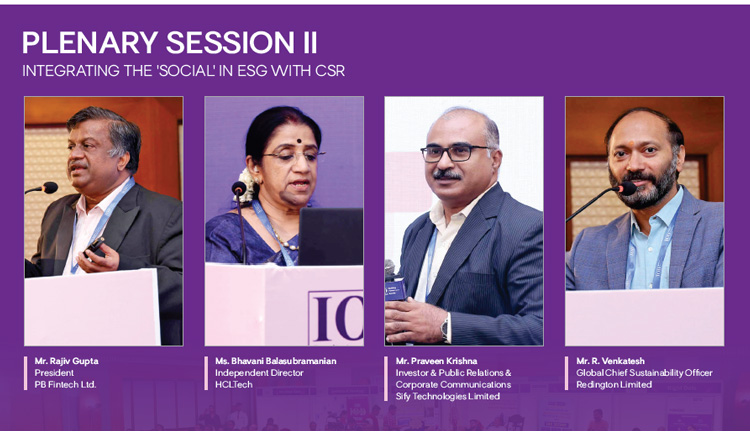
PLENARY SESSION II
INTEGRATING THE 'SOCIAL' IN ESG WITH CSR
This session brought together thought leaders and practitioners to explore how businesses can embed inclusive growth and sustainability into their core strategies. From integrating the 'Social' pillar of ESG to aligning CSR with India's developmental priorities, speakers shared powerful frameworks, real-world case studies, and innovative approaches. With a strong emphasis on data-driven planning, community partnerships, and measurable outcomes, the session underscored that inclusive development is not just ethical but a strategic imperative for long-term value creation and resilience.
The panel featured the following distinguished speakers:
1. Mr. Rajiv Gupta
President - PB Fintech Ltd.
2. Ms. Bhavani Balasubramanian
Independent Director - HCLTech
3. Mr. Praveen Krishna
Investor & Public Relations & Corporate Communications
Sify Technologies Limited
4. Mr. R. Venkatesh
Global Chief Sustainability Officer
Redington Limited
Mr. Rajiv Gupta, spoke around the theme of 'Driving inclusive and sustainable impact', where he made a compelling case for integrating the 'Social' pillar of ESG into mainstream corporate strategy which directly influences a company's long-term viability and social license to operate. Mr. Gupta outlined a framework for meaningful integration:
• Aligning CSR to purpose
• Embedding clear social metrics
• Prioritizing inclusion, and
• Focusing on long-term outcomes.
He stressed on adopting structured measurement tools like Social Return on Investment (SROI) and adhere to evolving disclosure norms such as SEBI's BRSR Core. Concluding his address, he reaffirmed that inclusive growth is not just a moral obligation but a strategic necessity.
Ms. Balasubramanian, delivered an insightful address focused on aligning corporate social responsibility with India's most urgent developmental needs- Education, Health & Environment. Her presentation centered around three key themes: education, health, and the environment which was framed through award-winning projects supported by the HCLTech Grant. She emphasized that HCL's CSR strategy is guided by a vision to build empowered, inclusive, and sustainable communities. The case studies featured:
• Sambalam, an inclusive education initiative by integrating ICT tools for children with visual impairment across multiple states.
• Project MANCH, implemented in Madhya Pradesh's tribal-dominated Shahdol district, addressed to maternal and child health by building nursing capacity, setting up skill labs, and mapping high-risk pregnancy zones.
• Nilgiris Biosphere Reserve, where HCL supported community-led efforts to restore wetlands and mitigate human-wildlife conflict.
Her address centered on- strong partnership for CSR demands, data-driven planning, and thematic focus aligned with the SDG.
Mr. Krishna, addressed the Conclave on the theme: 'Catalyzing Growth through ESG -Driven Sustainability'. He emphasized on the importance of:
• Setting the right tone at the top
• Ensuring a continuous feedback loop
• Top-down and Bottom-up approach
The clarity of purpose at the board level, he said, is essential in translating corporate values into tangible, trackable outcomes. Mr. Krishna shared a series of powerful case studies to illustrate innovation and diversity in ESG initiatives including Hasiru Dala's story of transforming waste-picking into dignified, organized employment; world's first fully solar powered-Cochin International Airport; a reforestation and water management project in Burkina; and Reliance's Jamnagar mango orchards. He concluded with the reminder that inspiration can come from anywhere what matters is a mindset open to learning and a willingness to act with purpose.
Mr. Venkatesh's address showcased Redington's flagship programs such as Skill to Employ and Educate to Empower, particularly focusing on inclusive development for underserved communities. He also highlighted healthcare interventions, including pediatric heart surgeries, rural health camps, and AI-powered TB screening. On the environmental front, he spoke about efforts in waterbody restoration, solar energy installations, and community water resource development. Mr. Venkatesh emphasized that Redington's approach is data-driven, community focused, and collaborative addressing systemic gaps in education, healthcare, digital inclusion, and financial literacy. He concluded by stressing that ESG, particularly the 'Social' pillar, must move beyond compliance to become a central element of business strategy, driving both impact and resilience.
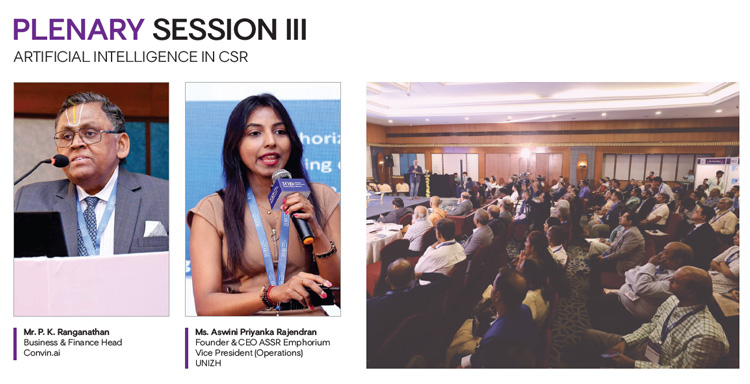
PLENARY SESSION III
ARTIFICIAL INTELLIGENCE IN CSR
The panel discussion was moderated by Mr. R. Venkatesh, and explored 'AI's role in evolving CSR' from a complianceled activity to a strategic enabler of inclusive development. Mr. P. K. Ranganathan shared how organizations like Convin.ai embed CSR within core operations by using AI tools for education, disaster alerts, and waste management. Ms. Aswini Priyanka Rajendran highlighted how her organization uses AI for real-time data analysis, Chabot support for education and mental health, and impact measurement tools that bring transparency and efficiency to CSR. Both panellists emphasized that CSR must move beyond traditional philanthropic models to embrace technology as a catalyst for scale, accountability, and precision.
The session was moderated by:
Mr. R. Venkatesh
Global Chief Sustainability Officer
Redington Limited
The session had the following distinguished Panellists:
1. Mr. P. K. Ranganathan
Business & Head Finance
Convin.ai
2. Ms. Aswini Priyanka Rajendran
Founder & CEO – ASSR Emphorium
Vice President (Operations) – UNIZH
Mr. Ranganathan highlighted how emerging technologies, particularly Artificial Intelligence can transform Corporate Social Responsibility (CSR) from a compliance-driven task into a strategic tool for measurable impact, since AI, conversational interfaces, and data analytics are already enabling real-time decision-making, hyper-local insights, and better impact tracking in areas like disaster response and sustainability. He also pointed to blockchain and IoT as important tools for ensuring transparency and traceability in CSR execution. Calling for structured adoption of technology, Mr. Ranganathan recommended piloting AI-led initiatives, allocating budgets, and forming dedicated teams. He concluded by reminding that while technology is a powerful enabler, decisions must remain rooted in human judgment and ethical leadership.
Ms. Rajendran, in her presentation “Artificial Intelligence in CSR: Transforming Social Responsibility,” highlighted how AI enhances the effectiveness, scalability, and transparency of CSR initiatives. Showcasing examples like Microsoft's AI for Earth and IBM Watson's social projects, she demonstrated AI's impact in areas such as sustainability, healthcare, education, and ethical sourcing. She concluded by stressing the need for ethical deployment through strategies like data anonymization, encryption, and bias audits.
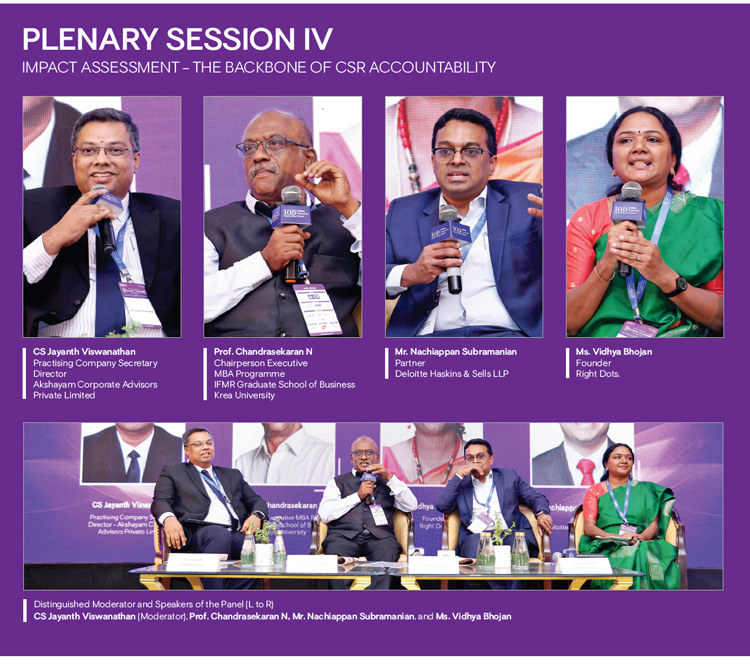
PLENARY SESSION IV
IMPACT ASSESSMENT – THE BACKBONE OF CSR ACCOUNTABILITY
The panel discussion on “CSR Accountability and Impact Assessment” brought together experts from academia, consulting, and social impact sectors to explore how corporates can transition from compliance-driven CSR to purpose-led and measurable impact. The session provided insights into rethinking CSR through the lens of governance, innovation, and evidence-based outcomes. All three panelists echoed the importance of collaboration between corporates, civil society, academia, and thirdparty verifiers so as to ensure that CSR efforts are not only compliant but meaningful, transparent, and scalable. They called for a mindset shift where CSR is no longer seen as an annual obligation but as a long-term investment into shared societal value.
This session was moderated by:
CS Jayanth Viswanathan
Practising Company Secretary
Director
Akshayam Corporate Advisors Private Limited
The session had the following distinguished panellists:
1. Prof. Chandrasekaran N.
Chairperson, Executive MBA Programme,
IFMR Graduate School of Business
Krea University
2. Ms. Vidhya Bhojan
Founder - Right Dots
3. Mr. Nachiappan Subramanian
Partner - Deloitte Haskins & Sells LLP
Prof. N. Chandrasekharan, opened the forum emphasizing on the need for CSR to move beyond a finance-centric or compliance-only function. He argued that true accountability comes when organizations design initiatives that are rooted in ground realities and community needs. Drawing from both academic and onthe ground perspectives, he encouraged boardrooms to integrate ESG consciousness across every layer of the organization not as an afterthought but as part of the organisational ethos.
Mr. Subramanian, highlighted that the challenge today is not the lack of CSR activity, but the lack of clarity around impact. From a governance standpoint, he called for stronger board oversight, better alignment between CSR goals and business purpose, and more rigorous frameworks for data collection and third-party assessment. He also emphasized that boards should treat ESG reporting with the same seriousness and scrutiny as financial disclosures.
Ms. Bhojan, offered a practitioner's perspective, advocating for increased involvement of community voices in CSR design and monitoring. She shared her experience working with Right Dots to build participatory models for impact assessment that go beyond numerical metrics. In her view, real accountability lies in the stories of transformation, and measuring only outputs misses the point. She called for empathy-driven evaluation models that balance qualitative and quantitative outcomes.
The 'Closing Remarks' & 'Vote of Thanks' were delivered by:
Dr. Sundari Suresh
Chief General Manager
Institute of Directors (IOD), Chennai Region
Dr. Suresh in her concluding remarks reflected on the evolving role of corporate boards as key drivers of ethical governance, sustainable development, and social equity. Her deliberations underscored a central takeaway: 'inclusive growth is not a secondary outcome of CSR and ESG efforts, but rather the most accurate metric of their success.'
She also expressed her heartfelt gratitude to all the sponsors of the event, the guests, speakers, dignitaries and the IOD Chennai team for making the conclave a grand success.
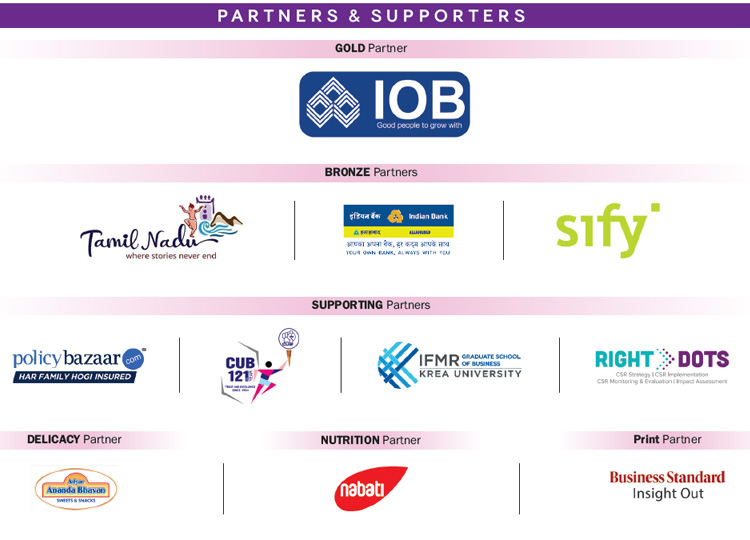
The Institute of Directors (IOD), Chennai Region extends its sincere gratitude to its Event Partners:
Gold Partner:
• Indian Overseas Bank
Bronze Partners:
• Tamil Nadu Tourism Development Corporation
• Indian Bank
• Sify Technologies
Supporting Partners:
• Policy Bazaar
• IFMR Krea University
• City Union Bank
• Right Dots
Print Partner:
• Business Standard
Delicacy Partner: • Adyar Ananda Bhavan
Nutrition Partner: • Nabati India
This report is compiled by:
Dr. Sundari Suresh
Chief General Manager
Institute of Directors (IOD)
Chennai Region
Author

Institute of Directors India
Bringing a Silent Revolution through the Boardroom
Institute of Directors (IOD) is an apex national association of Corporate Directors under the India's 'Societies Registration Act XXI of 1860'. Currently it is associated with over 31,000 senior executives from Govt, PSU and Private organizations of India and abroad.
Owned by: Institute of Directors, India
Disclaimer: The opinions expressed in the articles/ stories are the personal opinions of the author. IOD/ Editor is not responsible for the accuracy, completeness, suitability, or validity of any information in those articles. The information, facts or opinions expressed in the articles/ speeches do not reflect the views of IOD/ Editor and IOD/ Editor does not assume any responsibility or liability for the same.

 Quick Links
Quick Links
 Connect us
Connect us




 Back to Home
Back to Home






























